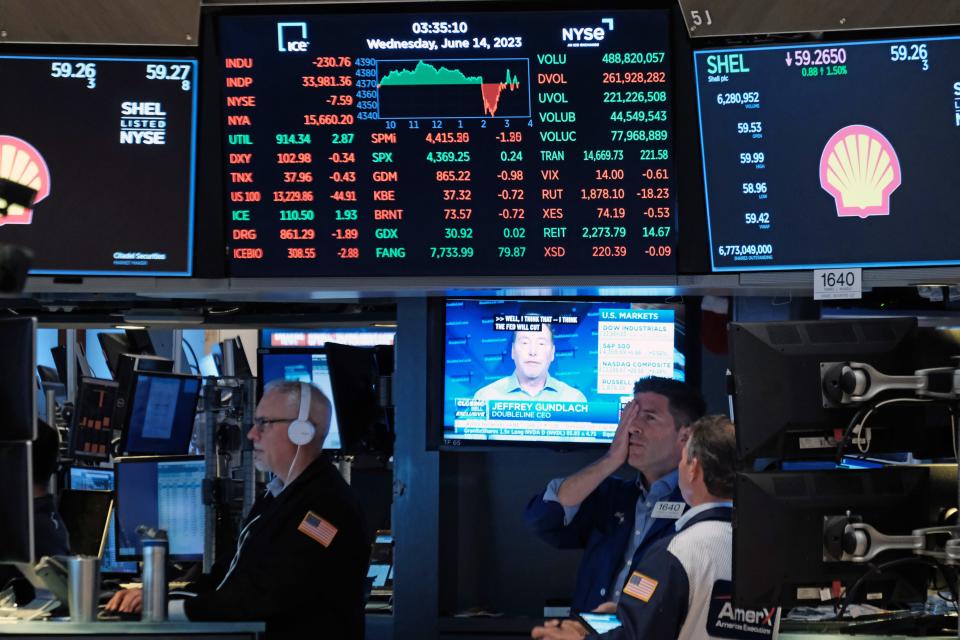How's your 401k doing after 2022? For retirement-age Americans, not so well
In the world of retirement savings, younger investors have largely recovered from the market turmoil of 2022. Older investors have not.
By the midpoint of 2023, the average millennial saver had made up all of their losses from the previous year, according to data from Fidelity Investments. The average 401(k) balance for millennials stood at $48,300 through June 30, up from $48,000 at the close of 2021.
Baby boomers, by contrast, remain underwater. The average 401(k) account for boomers held $220,900 at the end of June, compared with $249,700 at the end of 2021.
Last year “was an extremely difficult year for investors,” said Catherine Collinson, CEO and president of the nonprofit Transamerica Institute and Transamerica Center for Retirement Studies.
Stocks have moved plenty in 2023, if not necessarily up. The Dow Jones Industrial Average is trading in the 33,000 range, near where it started the year.
"There was supposed to be a rally," said Lili Vasileff, a certified financial planner in Greenwich, Connecticut. "It hasn't happened. If anything, it's fizzled."
But older investors have faced a unique challenge this year: recovering from last year when both stocks and bonds took a bath.

The worst year ever for stocks and bonds?
Stocks shed 18.6% of their value in 2022, as measured by the S&P 500, a loss that swells to 25% after adjusting for inflation, according to a NASDAQ analysis.
Bonds lost 13.7% of their value, according to the Vanguard Total Bond Market Index. Inflation pushes that figure to 20%, the worst bond return in 97 years, according to NASDAQ.
A quick primer: Companies and governments issue bonds to raise money from investors. Bonds reward buyers with interest payments. The value of a bond rises and falls with its appeal to investors. If the market price goes up, the yield in interest goes down, and vice versa. Returns on bond funds, such as the Vanguard index fund, depend on both the market price of the bonds in the fund and interest income payments.
Bonds serve as a hedge against stocks. Bond values are comparatively stable, and they tend to rise when stocks fall.
“In a normal year, you would really see bonds serving as ballast in a portfolio when stock prices are falling,” said Andy Baxley, a certified financial planner in Chicago. “There wasn’t anywhere to hide last year, unfortunately.”
Taken together, double-digit losses in stocks and bonds made 2022 “the biggest outlier year in history,” said Jim Reid, head of thematic research at Deutsche Bank, speaking to MarketWatch.
And that is why older investors are suffering.
Common wisdom instructs that retirement savers should gradually pivot from stocks to bonds as they age so that after retirement, their balance won’t waffle dramatically from year to year.
As a result, older investors generally have more bonds in their retirement accounts. And 2022 was a historically bad year for bonds.
Bonds backfired on boomers in 2022
The Vanguard Total Bond Market Index is down about 15% since the autumn of 2020, when it stood near its all-time high, according to Vanguard.
The Dow, by comparison, is trading at roughly 10% below its historic peak, reached in January 2022.

Combined losses in stocks and bonds fed a steep decline in the value of the average boomer’s 401(k), from $249,700 at the end of 2021 to a low of $197,400 in the autumn of 2022, a drop of more than 20%, according to Fidelity.
By mid-2023, the average boomer account had recovered to $220,900, 12% below the 2021 high.
Many retirees feel they are in worse financial shape now than before the pandemic began, even though stocks are trading higher than in 2019.
In an annual Transamerica Retirement Survey, released in September, 33% of retirees said their finances had worsened in those years, while only 9% said they had improved. The Harris Poll conducted the survey, which covered a representative sample of over 50 workers and retirees.
Younger generations have fared better. According to Fidelity data through June 2023, the average Gen X retirement account stands at $153,300, down 8% since the end of 2021. Millennials are up 1%, at $48,300. Generation Z is up 53%, at $8,100.
Fidelity officials caution that those averages are an imprecise tool for measuring gains and losses. Investors come and go, taking their money with them and affecting the value of the average 401(k) account. Some boomers are retired, drawing down their accounts while younger savers build theirs up.
And therein lies another reason why the past year has proven so treacherous for older investors.
Young investors could profit from the down market; older investors, not so much
Younger savers can actually profit from a down market “because they’re buying stocks when they’re quote-unquote cheaper,” said Maria Bruno, senior financial planning strategist at Vanguard.

Many retirees, by contrast, have been forced to “sell low”: to trade assets that have lost 10% to 20% of their value. Those sales exact a steep cost.
“If you’re taking out $5,000 or $7,000 in a down year, it has a very significant impact on how long that money is going to last,” Vasileff said.
Consider a retiree with $500,000 in retirement savings and $5,000 in monthly expenses. In a good year, her investments might gain enough value to offset the withdrawals, leaving her with the same $500,000 at year’s end.
But in 2022, the same retiree might have seen her nest egg shrink from $500,000 to $450,000. Factor in the $5,000 monthly withdrawals, and she might have ended the year with less than $400,000 remaining.
“Drawing down from savings in a down market can accelerate the depletion of your savings,” Collinson said, “depriving your overall account of the ability to recover when the markets recover.”
It's a classic example of selling low: once the assets are gone, you can no longer reap the rewards when their value rises anew.
The American Dream: It's always been elusive. Is it still worth fighting for?
401(k) in bad shape after last year? Time to see a financial adviser
Now would be a great time for anyone with diminished retirement funds to consult a financial planner, investment experts say.
But baby boomers aren’t big on seeking expert advice.
“The boomers are what you call do-it-yourselfers,” said Michael Shamrell, vice president of thought leadership at Fidelity. They are less likely than younger generations to work with a financial adviser. Instead, “they’ve been managing their own allocation,” Shamrell said, which means their investments “might not be exactly where a Fidelity or someone else thinks they should be.”
In the Transamerica survey, fewer than four in 10 workers and retirees in the over-50 range said they were working with a financial adviser.
“They are either taking the do-it-yourself approach or relying on family and friends,” Collinson said.
As stock and bond indexes continue to seesaw, analysts say, retirement balances are not likely to improve any time soon.
The bright spot? Bonds, again.
Rising interest rates “decimated” the value of previously issued bonds over the past year, Baxley said. The same rising rates also mean that new bonds “are going to be paying a significantly higher interest rate going forward.”
The 10-year Treasury yield reached 4.858% on Friday, the highest since July 2007.
“With bond investing,” Baxley said, “I think it’s short-term pain for a potentially long-term gain.”
This article originally appeared on USA TODAY: 401k balances haven't recovered from 2022 for retirement-age Americans
